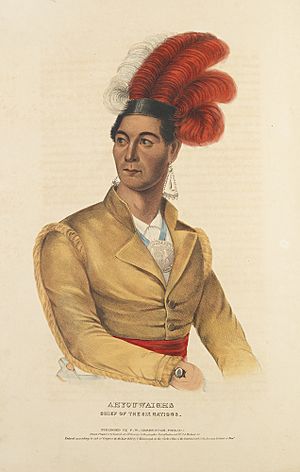John Brant (Mohawk leader) facts for kids
Quick facts for kids
John Brant
|
|
|---|---|
| Ahyonwaeghs | |
 |
|
| Mohawk leader | |
| Personal details | |
| Born | September 27, 1794 Near today's Brantford, Ontario |
| Died | August 27, 1832 (aged 37) Near Brantford, Ontario |
| Cause of death | Cholera |
| Relations | Uncle, Johannes Tekarihoga |
| Parents | Joseph Brant (Thayendanegea), Catharine Croghan Brant (Adonwentishon) |
| Known for | First Indian lawmaker in Upper Canada's parliament; fought in Battle of Queenston Heights, encouraged school construction, resident superintendent, Six Nations of the Grand River |
John Brant, also known as Ahyonwaeghs, was an important Mohawk leader and government official. He lived from September 27, 1794, to August 27, 1832. He played a key role in the early history of Upper Canada, which is now part of Ontario, Canada.
Contents
Early Life and Family Connections
John Brant was born near what is now Brantford, Ontario. His father was Joseph Brant (Thayendanegea), a famous Mohawk chief. Joseph Brant was well-known for his leadership during the American Revolutionary War.
John's mother was Catharine Croghan Brant (Adonwentishon). Her family was very important in Mohawk society. The Mohawk people have a matrilineal system. This means that family lines and important titles pass down through the mother's side.
The Tekarihoga Title
Catharine's mother was the sister of Johannes Tekarihoga. He was one of the traditional Mohawk civil leaders, called a sachem. In the Mohawk system, women in the family chose the next Tekarihoga from their male relatives. Because of his mother's important family, John Brant was seen as a possible future leader from a young age.
A Young Warrior in the War of 1812
In 1802, John Brant's family moved near Burlington Bay. He went to school in Ancaster and Niagara. When the War of 1812 broke out, John Brant was still young.
He joined forces with another Mohawk chief, John Norton. Together, they led Indigenous warriors. Their goal was to stop an American attack. They fought bravely at the Battle of Queenston Heights in October 1812. John Brant became a lieutenant in the Indian Department. He took part in several battles throughout the war.
Working for His People
After the war, John Brant worked hard for his people. He helped his uncle try to get a formal land deed. This deed was for land along the Grand River. This land was given to the Six Nations by the Haldimand Proclamation.
In 1821, John Brant traveled to England. He went with Robert Johnson Kerr to discuss the land issue. The government of the colony wanted to control the sale of Indigenous lands. Despite their efforts, the government kept control over these sales.
Supporting Education
John Brant strongly believed in education. He encouraged the building of schools for his people. He wanted to make sure Mohawk children had opportunities to learn.
Becoming a Superintendent
In 1828, John Brant was given an important job. He was named the resident superintendent for the Six Nations of the Grand River. This meant he was in charge of managing affairs for the Six Nations community.
First Indigenous Lawmaker
In 1830, John Brant made history. He was elected to the Legislative Assembly of Upper Canada. This was the parliament, or law-making body, for Upper Canada. He represented the area of Haldimand.
This made him the first Indigenous person to be a lawmaker in Upper Canada's parliament. However, his time in office was short. A year later, his right to hold the seat was questioned. The law at the time required landowners to have a certain amount of property to be in the Assembly. John Brant was removed from office, and John Warren was declared the winner.
Later Life and Legacy
Around 1830, John Brant's mother, Catharine, named him as the next Tekarihoga. He took on this important leadership role after his uncle Henry Tekarihoga passed away.
Sadly, John Brant held the office for only a short time. He died in 1832 near Brantford. He was a victim of a cholera outbreak, a serious illness that spread widely at the time. He was married to Ann Seabrook on February 17, 1825. John Brant is remembered for his dedication to his people, his military service, and his pioneering role in politics.

